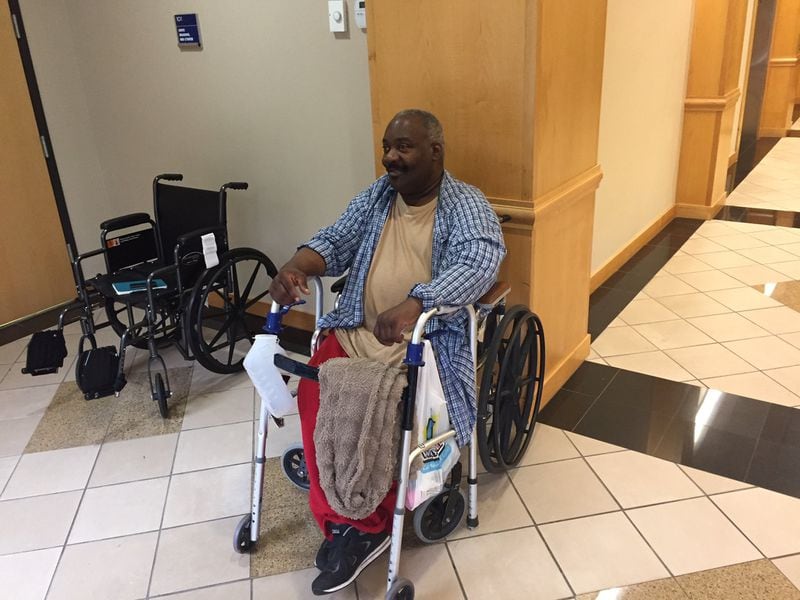The state pays LogistiCare tens of millions of taxpayer dollars a year to make sure frail and elderly Medicaid patients get to their doctors safely and on time.
The privatized system is structured so the contractor sets its own rates with subcontractors — the mom-and-pop van companies that push wheelchairs, carry stretchers, lock safety restraints and navigate traffic. LogistiCare keeps more if the subcontractors are paid less.
Struggling to stay afloat, some of those companies can face pressures to run as many rides as possible, as quickly as possible, using drivers who earn barely above minimum wage.
That can imperil the vulnerable patients the system is designed to serve, an investigation by The Atlanta Journal Constitution found.
The newspaper found repeated failures to pick up passengers on time, sometimes causing them to miss crucial appointments or leaving them stranded for hours after their treatment is complete. Some companies run vehicles that are more than 15 years old, with hundreds of thousands of miles on their odometers. The AJC’s review of complaints lodged with LogistiCare found that mechanical problems have put patients at risk.
One man suffered repeated seizures after being seated in the back of a van with broken air conditioning. Another patient was seriously injured when a cab with thread-bare tires spun out of control on black ice and went off the roadway.
Pressures on transportation providers may also be the cause of a recurring pattern of injuries the AJC found in its examination of the state's non-emergency transport system. Many of the injuries involved patients who weren't restrained properly in moving vehicles or weren't guided properly while entering or exiting vans.
Asked about concerns that drivers may be in too much of a hurry, LogistiCare's Executive Vice President Steve Linowes said what the company can do is enforce training requirements and provide incentives for compliance. Some of the transport companies, he said, have thrived.
“Our culture is a culture of caring and compassion. We communicate that back down to the (transportation companies),” he said. “We are very exact in what our expectations are and what we are going to hold them accountable for.”
The company’s Georgia general manager, Casey Tillman, said some late arrivals are inevitable with the company running 2 million to 3 million rides per year. A lot can go wrong, he said, between taking a reservation and making a pickup, such as vehicle breakdowns or passengers not being out of bed when drivers show up.
“There will always be these kind of caveats that will cause some kind of delay,” he said.
David James said LogistiCare often had him sitting idle for hours waiting for rides to and from his dialysis appointments, when he lived in Rex, in Clayton County. Vans arrived as much as two hours late on dozens of occasions, he said. About a half dozen times, he gave up and called his sister to drive him.
"By you coming late, you can't get the whole treatment," said the 58-year-old former construction contractor with heart disease and kidney failure. "You need the full treatment to get trash and sediment and impurities out of the system."
Such service not only raises questions about the Georgia Department of Community Health's oversight of the program, it also undermines the federal government's reasoning for providing free rides to Medicaid patients: to keep them healthy and out of emergency rooms, keeping overall health care costs down.
Sometimes late, sometimes never
Each quarter, the state routinely levies fines against LogistiCare for contract infractions. The most frequent basis for fines has been drivers not keeping schedules.
Since 2012, LogistiCare has paid $210,000 for more than 400 instances of its subcontractors being late or keeping patients riding for too long.
In one cited case, a transport company failed to show up for a patient five times in a month, leading to missed appointments. Another time, a driver took off after four minutes of waiting for a patient. On another occasion, a patient gave up waiting and walked.
LogistiCare was fined another $56,000 for 42 botched dialysis trips, including subcontractors getting patients to appointments late or not getting them there at all.
Such failures could be catastrophic for patients with kidney failure, said Janice Lea, professor of Medicine at Emory University. "They can get fluid overloaded," Lea said. "They can get high potassium which can cause cardiac arrest."
If they’re forced to wait after dialysis to get a ride home, they could be dizzy, weak and fatigued. Without food, their blood sugar could drop. “It could be life-threatening if they don’t follow the schedule,” Lea said.
To ensure that patients make their appointments, Romero Ball, a secretary at Trinity Dialysis Clinic in East Point, calls LogistiCare the day before to remind them. He said he dreads making those calls.
“You could actually be on that phone with LogistiCare for two hours,” he said, dialing its phone number as a reporter watched. Five minutes into the call, Ball still hadn’t reached a live person — well beyond the contract-required average monthly answer time of 60 seconds.
Late rides also are a persistent problem, Ball said. He described one patient who’s almost never on time.
“His chair time is 10:30. They (sometimes) get him here a quarter to one,” Ball said. “His pick-up time is 2:30. They come here 9 o’clock at night.”
In summer 2015, James, the dialysis patient, recalls waiting more than six hours after an appointment, with no food or drink other than the dialysis center’s water fountain. Every time he called LogistiCare, a rep told him to wait 15 or 20 more minutes, he said. He finally gave up and called his sister.
“They said they was coming,” James said. “And from the time I waited, until my sister came, hadn’t nobody came.”
LogistiCare confirmed that James’ health care providers raised concerns on about seven occasions, prompting the company to find other transportation providers to drive him.
In a statement, the company apologized for his bad experiences, but pointed out that 95 percent of his 141 rides didn’t generate complaints.
Tillman said when patients complain, the company tries to make sure the problem doesn’t happen to them again.
“There is no way possible that we are not going to have a couple of deficient trips. Again, we take that information and we try to figure out how we mitigate it or reduce that,” Tillman said.
Buttressed from blame
LogistiCare often passes along fines to the transport companies. Some companies said they're so financially squeezed by the system, they can't afford to operate more vehicles or pay drivers much more than minimum wage.
Ted O’Steen, owner of Peach State Non-Emergency Transport in south Georgia, said he pays his drivers $8.50 to $9 per hour.
“If I paid my employees 50 cents more per hour, I would just have to shut the doors,” O’Steen said. “That goes back to what I get paid by LogistiCare, and LogistiCare, I think, pays it based on what they contracted.”
Managers at two other Georgia transportation companies described having to juggle a demanding schedule of rides.
"You tell me how you can get all these places in that amount of time," said Jonathan Johnson, a manager for Vidalia-based Relicare, which quit working for LogistiCare about a year ago. "And they know you can't do it. And as soon as you're late, that's when you get fined. You get a fine for $5,000. You gotta' work two days to make $5,000."
LogistiCare said it’s not trying to squeeze subcontractors but rather help them flourish. It also helps them in other ways, such as pointing them to discounted gas and tires, Linowes said. “We do treat them as partners,” he said, “but again we do have an arms-length relationship.”
Fines are part of the “stick” LogistiCare uses to set expectations, Linowes said. It might also reduce a transport company’s assigned rides, and thus its payments. Or it can “recommend” that a transport company suspend or retrain a driver.
When there is a pattern of noncompliance, such as missed appointments, use of vans that haven’t been inspected, or lapsed insurance, LogistiCare officials say they have ended contracts.
“Those are the management responsibilities that (LogistiCare) has,” Linowes said. “As a result, access improves and the performance of the providers increases as well, because we’re also holding them accountable.”
The system, though, can lead to a dangerous mindset for drivers on the front lines, said Ned Einstein, a New York-based transportation consultant who has served as an expert witness in several lawsuits against LogistiCare.
Einstein, who ran a paratransit service in Los Angeles County in the 1980s and 1990s, said properly locking in a wheelchair and strapping in a patient can take five minutes or longer — more time than some drivers can afford.
"The schedules are all too tight," Einstein said, "and the drivers are committing what are called safety compromises in order to make those schedules."
Other risks
Patient safety also can be compromised if vehicles aren’t maintained.
LogistiCare is required to inspect each vehicle in its network twice a year, along with surprise inspections. They look to see if wheelchair lifts work right; if AC, heat and lights work; if tire tread is adequate; if the vehicle has a biohazard spill kit and fire extinguisher.
An oversight can have dire consequences. One driver apparently didn’t buckle in a patient because the van lacked seatbelt extensions, according to a 2015 complaint. The driver slammed on the brakes in traffic, jettisoning the woman from her wheelchair, banging her head and dislocating her shoulder.
Four LogistiCare employees carry out inspection duties for more than 1,100 vehicles, the AJC found. Some inspections apparently take only five minutes, according to inspection records the state receives.
The AJC’s review of those records found some vehicles topping a half million miles, such as a 2002 Ford Econoline van owned by Five Star Express Transit, which clocked 746,664 miles at its January 2017 inspection. The van failed because of AC/heating issues.
Such inspection failures are rare, though.
A middle Georgia company’s 1998 Ford Super Wagon with a back bumper beat up and 657,910 miles on its odometer passed in May.
Peach State Non-Emergency Transport has had 11 vehicles inspected this year, all passing, including a 2010 Ford Econoline van with 300,896 miles. O’Steen, the company owner, said whether he uses new or old vehicles, maintenance and insurance costs still diminish his bottom line.
"The margins are very tight," he said. "If I was looking for another business to get in, it would probably not be this business. As needed as it is, the money is not there."








